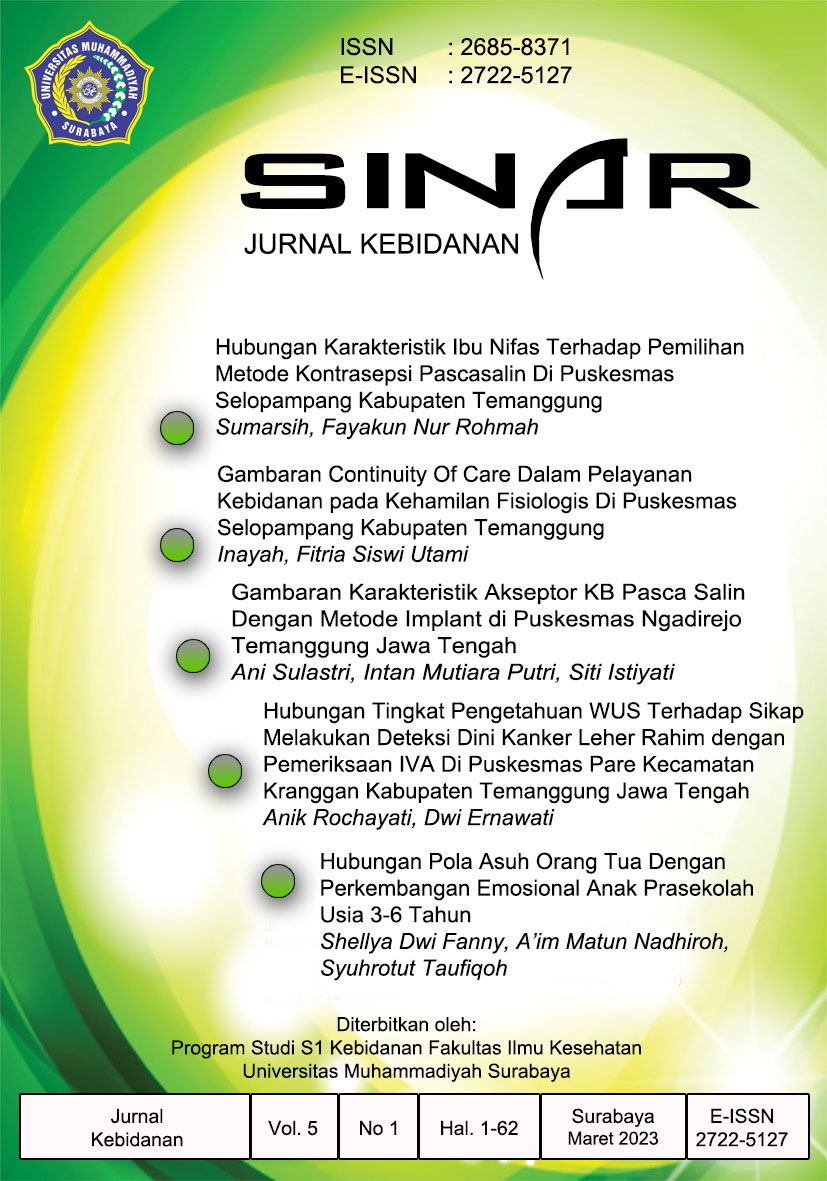GAMBARAN KARAKTERISTIK AKSEPTOR KB PASCA SALIN DENGAN METODE IMPLANT DI PUSKESMAS NGADIREJO TEMANGGUNG JAWA TENGAH
Abstrak
Objective: The government is pursuing strategic programs to reduce MMR, unmeet need and TFR with postpartum family planning. The purpose of this study was to find out how the characteristics of postnatal family planning acceptors with the implant method are described.
Methods: This study uses a quantitative descriptive method. The population in this study were 36 respondents who received postnatal family planning implants using a total sampling technique. The type of data uses K/IV/KB/15 secondary data. Data analysis used univariate analysis with frequency distribution.
Results: The results showed that the description of the characteristics of postnatal contraception acceptors using the implant method was in healthy reproductive age of 20-35 years (75%), middle/high school secondary education (72.2%), number of children ≥3 (50%), history of contraception. have ever had family planning (55.6%), have health insurance/JKN (83.3%) and the characteristics of working and not working obtained the same number (50%).
Conclusion: The description of postnatal contraception acceptor characteristics with implant method at Ngadirejo Primary Health Center Temanggung Central Java was the majority in healthy reproductive age (20-35 years), secondary education (Junior High School/Senior High Scholl), a history of contraception that has had family planning, and has Health Insurance/JKN. The characteristics of the number of children, working and not working are obtained in the same number.
Artikel teks lengkap
Referensi
Dukcapil. 2022. “273 Juta Penduduk Indonesia Terupdate Versi Kemendagri.†Kemendagri. Retrieved (https://dukcapil.kemendagri.go.id/berita/baca/1032/273-juta-penduduk-indonesia-terupdate-versi-kemendagri).
Gayatri, Maria. 2019. “Determinants of IUD Use in Sukmajaya Sub District, Depok: A Qualitative Research.†Jurnal Kesehatan Komunitas 5(3):185–90. doi: 10.25311/keskom.vol5.iss3.467.
Kemenkes, RI. 2016. Kesehatan Reproduksi Dan Keluarga Berencana. Vol. 1. 1st ed. edited by I. Prijanti. Kementerian Kesehatan Kesehatan Republik Indonesia.
Kemenkes, RI. 2020. Pedoman Pelayanan Kotrasepsi Dan Keluarga Berencana. 1st ed. edited by R. Kemenkes. Jakarta: Kementerian Kesehatan Kesehatan Republik Indonesia.
Laput, Dionesia Octaviani. 2020. “Pengaruh Paritas Terhadap Penggunaan Kontrasepsi Implant Di Wilayah Kerja Puskesmas Wae Mbeleng, Kecamatan Ruteng.†Wawasan Kesehatan 5(1):6–10.
Oktariyanto, Oktariyanto. 2016. “Penyelenggaraan Pelayanan Keluarga Berencana Dalam Jaminan Kesehatan Nasional.†Jurnal Ilmu Keluarga Dan Konsumen 9(2):77–88. doi: 10.24156/jikk.2016.9.2.77.
Pardosi, Magdalena, Donal Nababan, Netti Etalia Brahmana, and Mido Ester Sitorus. 2021. “Faktor - Faktor Yang Berhubungan Dengan Minat Ibu Bersalin Dalam Pemilihan Alat Kontrasepsi KB Pascasalin Dengan Metode Kontrasepsi Jangka Panjang Di Kecamatan Rantau Utara Tahun 2021.†Journal of Healtcare Technology and Medicine 7(2):1470–84.
Purwandari, Atik, and Sandra Tombokan. 2017. “Analisis Faktor-Faktor Yang Berhubungan Dengan Pengetahuan Akseptor KB Dalam Pemilihan Alat Kontrasepsi Implant Di Puskesmas Tuminting Kota Manado.†PROSIDING Seminar Nasional Tahun 2017 ISBN : 2549-0931 Vol 1 No 2:415–23.
Rahman, Fauzie. 2017. “Buku Kontrasepsi Meitria.Pdf.â€
Rahmawati, Anisa, Wina Rachmania, and Fenti Dewi Pertiwi. 2019. “Gambaran Pengguna Kontrasepsi Implant Pada Pus Di Kelurahan Cibadak Kecamatan Tanah Sareal Tahun 2018.†Promotor 2(6):461. doi: 10.32832/pro.v2i6.3136.
Ruspawan, I. Dewa Made, and I. Gusti Ayu Dewi Puspita Rahayu. 2017. “Persepsi Dan Sumber Ekonomi Yang Mempengaruhi Rendahnya WUS Memilih Implant Sebagai Alat Kontrasepsi.†Jurnal Gema Keperawatan 10(2):169–76.
Sulistyoningtyas, Sholaikhah, and Luluk Khusnul Dwihestie. 2022. “Gambaran KB Pasca Salin Pada Masa Pandemi.†Jurnal Ilmiah STIKES Kendal 12:75–82.
Wakuma, Bizuneh, Getu Mosisa, Werku Etafa, Diriba Mulisa, Tadesse Tolossa, Getahun Fetens, and Et Al. 2020. “Postpartum Modern Contraception Utilization and Its Determinants in Ethiopia : A Systematic Review and Meta-Analysis.†1–21. doi: 10.1371/journal.pone.0243776.
Penulis
Hak Cipta (c) 2023 ANI SULASTRI

Artikel ini berlisensiCreative Commons Attribution-NonCommercial-ShareAlike 4.0 International License.
Hak Cipta ada di penulis, jurnal ini berada di bawah Lisensi
https://creativecommons.org/licenses/by-nc/4.0/


